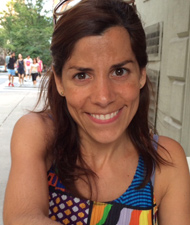"Biology allows me to improve people's quality of life from the laboratory"
Coro Paisan Ruiz graduated in Biology in 1999 from School and is currently working at Mount Sinai Hospital in New York.

PHOTO: Courtesy
Coro Paisan Ruiz studied Biology at the School of Sciences of the University of Navarra. After graduating in 1999 and motivated by a great research vocation, she decided to do the doctorate between the Donostia Hospital in San Sebastian and theNational Institute of Health in the United States. She has completed two postdoctoral stays and currently directs her own laboratory of Molecular Biology at Mount Sinai Hospital in New York where she studies movement disorders such as Parkinson's disease, parkinsonism and essential tremor. From there he recalls his stay at the University of Navarra as the first big step in his professional life and staff.
Why did you decide to study biology?
I was always interested in healthcare, but not from a doctor-patient point of view. Even though my parents are pediatricians and we were always pushed at home to study medicine, the field of biology gave me the opportunity to develop my passion for improving people's quality of life from laboratory. Discovering genes that help to understand the pathological process of disease and to develop drugs to improve the health of the sick is a source of immense pride.
You took your first professional steps at the University of Navarra, but what happened next?
I did the doctorate between the Donostia Hospital in San Sebastian and the National Institute of Health (NIH) under the supervision of Professors Jose Felix Marti-Masso (San Sebastian) and Andrew Singleton (NIH, USA). Later, I continued my postdoctoral programs of study in shared stays between the NIH and the University College London. I worked there for four years and two and a half years, respectively. Finally, I moved to New York where I run my own laboratory in Molecular Biology.
What is your work there?
We study movement disorders such as Parkinson's disease, parkinsonism and essential tremor. Among my professional findings are the finding of three genes involved in Parkinson's disease and atypical juvenile parkinsonism (LRRK2, PLA2G6 and SYNJ1). My laboratory has also participated in the finding of genes involved in other neurodegenerative diseases such as dystonia, spastic paraplegia and neurodegeneration with iron accumulation in the brain, among others.
After these years at development of a great professional degree program . To what extent has studying at the University of Navarra influenced you?
The preparation with which you leave Navarra is superior to that of other universities. We give many hours of internships and that has a great influence when it comes to starting to work, since we have much more experience from laboratory . I still remember the amount of practice we had in histological techniques, subject taught by Professor Luis Montuenga.
And from the point of view staff?
The variety of students studying at the University of Navarra is also very important. In each class there are practically students from all over Spain and abroad. Cultural diversity is very important because financial aid helps you to get to know, value and respect other cultures, something that has helped me in my professional career. Undoubtedly, my stay at the University of Navarra has helped me to understand and be more open to the different educations I have encountered.
In this sense, would you say that studying at the University opened doors for you to work outside Spain?
Yes, of course. In the United States, where you have studied at programs of study is highly valued. The national and international recognition that the University of Navarra has is very important. In addition, the University instills ethical values that are taken into account in many international organizations.
Finally, any anecdote or memory of the School...
I agreement a lot from the University because I met my husband there and thanks to his unconditional support I have managed to settle in the field of science. In addition, I maintain a good relationship with my roommates and university mates. Finally, I have fond memories of Professor María Jesús Calasanz. I think she is one of the best teachers I had and thanks to her I find Genetics and biostatistics very easy to understand.
